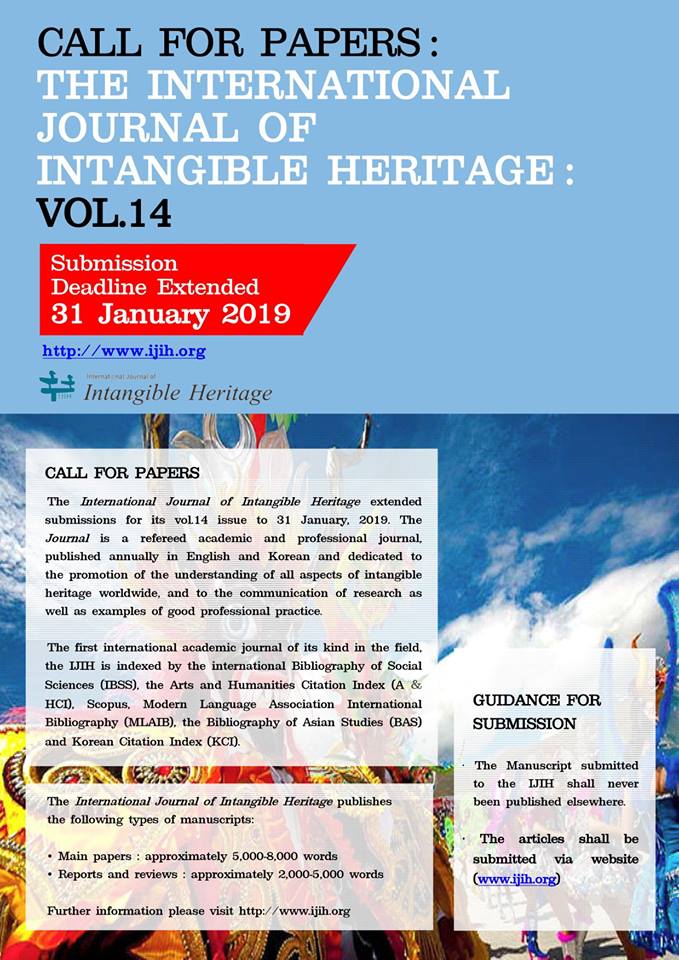Call for Abstracts: The Psychology of Heritage Places
Please consider this unique opportunity, below, to participate in solidifying a new field of study.
Accepted papers will be published in a special collection in Collabra: Psychology, a refereed journal from the University of California Press. These papers will be open access (available to anyone over the Internet, free of charge) to an international audience. Even if you have never considered publishing on a topic related to environmental psychology, there is a wide range of possible paper types, and the opportunity to completely define new theoretical and research directions from the unique perspective of an ICH scholar.
The Psychology of Heritage Places
THE PSYCHOLOGY OF HERITAGE PLACESAddressing a Neglected Area in Environmental Psychology Second call for abstracts — special Collabra: Psychology research nexus Co-editors: Abstract submission deadline: August 30, 2019 The problem: Psychologists (and their proponents) do not appear interested in built heritageAttention from psychologists in people-historic environment contexts is minimal. Regardless of the authors’ disciplines, scholarly articles, chapters, and books that address built heritage from a social science perspective fail to use methods from environmental and/or social psychology. In sum, with few exceptions, there is no representation from psychology in the social science literature that addresses built heritage. (Some of these exceptions are Ahn [2013], Askari, Dola, and Soltani [2014], Herzog and Gale [1996]; Herzog and Shier [2000], Levi [2005], Uzzell [2009], Wells and Baldwin [2012], and Wells [2017].) This special research nexus is therefore a call to action for researchers interested in validating the psychology of heritage places as an acceptable and needed area of research. Why a psychological perspective on built heritage?Environmental psychologists care about how the design of new buildings and places impact people and their behavior, but for some reason have overlooked the study of heritage environments. Or, in a more critical sense, psychologists have long neglected a normal part of everyday human experience. Traditionally understood to be closely associated with the fields of design, architecture, and history, built heritage conservation is increasingly being reconceptualized as a social science endeavor, especially through the rise of what has become known as “critical heritage studies” (Harrison 2013; Smith 2006; Winter 2013). What are the fundamental characteristics that define research in the psychology of heritage places?For the purposes of this special collection, submitted papers need to consider these
How you can contribute to this research nexusAll papers are welcome that address the historic environment and psychological perspectives in some way. While submissions from trained psychologists are especially encouraged, there is no disciplinary requirement. Authors from other disciplines should approach their work through methodological and/or theoretical approaches from social and/or environmental psychology. Specific suggestions for areas that papers could address include:
How to submit an abstract proposal for a paperAll interested authors should first submit a 300-word abstract by August 30, 2019 that proposes one the following types of papers: original research report, review article, perspective/opinion article, or a registered report. Because of the current paucity of research in this area, registered reports are especially encouraged because they focus on proposed, rather than completed, research. For more details, see https://www.collabra.org/about/submissions/. Authors should email their abstract with their full name, contact information, and institutional affiliation to Jeremy C. Wells (jcwells@umd.edu) with “Collabra: Psychology abstract” in the message subject. Successful authors will be invited to submit a full paper that will then undergo the normal peer review process for the journal. |


